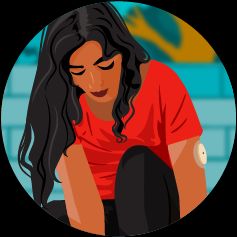Diabetes can be incredibly isolating when you don’t have substantial support. Here’s how connecting with others helped me thrive.
Diabetes management involves so many medical decisions and routines. Constant doctor’s visits and managing blood sugar levels on a daily basis require significant amounts of attention and decision making.
I had a very challenging couple of years following my diagnosis. Living with diabetes means I must carefully consider every aspect of my life to maintain health, from meals to physical activities to stress levels.
Managing diabetes while raising a family and running a business has been extremely challenging and even left me feeling incredibly lonely. While my family did their best to support me, they could not fully relate to having to drastically change your lifestyle so quickly.
Amid these challenges, I found support and connections I didn’t expect.
A 2024 research review showed that social support is crucial when managing a chronic condition. After feeling unsupported by social media support groups, I started searching for local diabetes support groups and found one in my community.
The first time I met the group in person, I knew I had found my people: women from all walks of life managing diabetes who share the same feelings of isolation and frustration about diabetes management. I felt seen and heard — it was liberating.
Through the support group, I’ve learned a lot about diabetes. And more importantly, I’ve learned how to care for myself and advocate for others.
My diabetes support leader introduced me to legislative advocacy, which has allowed me to speak on diabetes-related issues like drug affordability and access. A couple of years later, my support group leader asked me to host my own group. I accepted without hesitation and have been leading my group for 3 years.
I always knew when I was diagnosed with type 2 diabetes in 2019 that my case was atypical. I experienced some symptoms that didn’t connect with my initial diagnosis, but I didn’t know how to talk about it with my doctor or where to begin looking for answers.
Apart from my diabetes support group, I’ve also formed close friendships with a few other women who helped me get a second diagnosis.
Through diabetes support groups and advocacy events, I met four women who shared stories of being misdiagnosed with type 2 diabetes when they really had latent autoimmune diabetes (LADA). They advocated for themselves to get a correct diagnosis. In listening to their stories, I might be in a similar situation. These four ladies changed my life.
In 2022, I received a correct diagnosis of LADA after seeking additional testing from my endocrinologist. Their stories saved me from continuing to manage diabetes with the wrong treatment, further harming my health.
Although we live in different parts of the country, we still occasionally communicate via Zoom or text.
As people with diabetes, we can find lasting connections through various diabetes-related self-care routines, such as:
Support groups
Joining diabetes support groups in person or online can help you connect with others who share similar experiences and challenges.
Regular health appointments
Attending regular health appointments, like endocrinologist’s visits or diabetes education classes, can lead to friendships with others managing diabetes.
Fitness activities
Participating in diabetes-friendly fitness classes or exercise groups can help you find like-minded people who prioritize their health.
Self-care routines
Engaging in self-care activities, like regular pedicures or spa days, with others who have diabetes can foster close friendships through shared experiences.
Community events
Attending diabetes-related community events, workshops, or conferences provides opportunities to meet and connect with others in the diabetes community.
Diabetes support groups and advocacy circles introduced me to a community of like-minded people who understand the difficulties and triumphs of living with diabetes.
By sharing our experiences and tips for managing our condition, we developed a unique friendship rooted in understanding, empathy, and a sense of belonging that went beyond diabetes.
Through these connections, I have received emotional support and practical insights that have helped me significantly improve my diabetes journey. And I’ve been blessed with some of the most amazing friends.
My hope is that you’ll get to experience the same.






